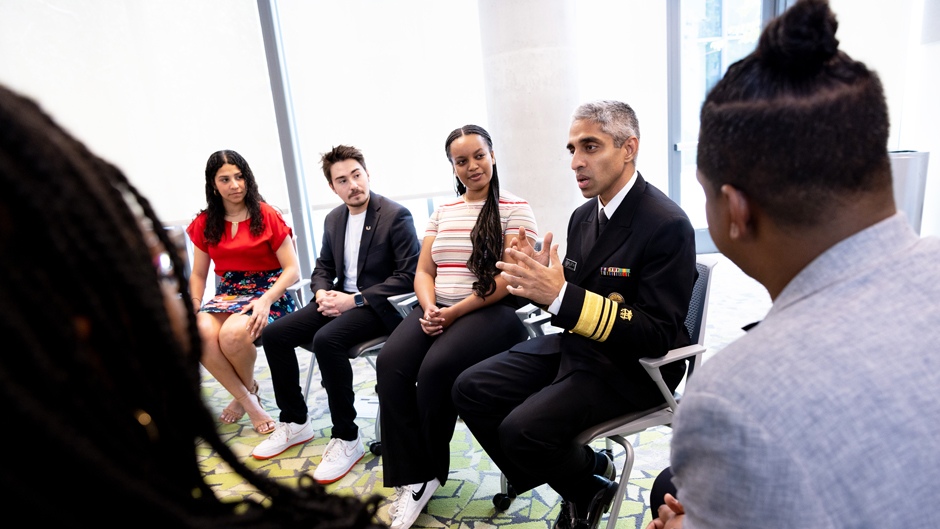From COVID-19 to heart disease to diabetes, one might easily think that these are the biggest threats to health in our world today.
But, U.S. Surgeon General Dr. Vivek Murthy argued that the biggest threat is isolation, loneliness, and social media, all culminating in a mental health epidemic for today’s society.
Murthy visited the University of Miami on Feb. 22 as part of his “We Are Made to Connect” college tour, speaking to students alongside University President Julio Frenk on the rapid acceleration of depression, anxiety, and other mental health risks in a post-pandemic world, especially amongst college students.
Emily Goldstein, a senior and chair of student organization Counseling Outreach Peer Education (COPE), opened the afternoon event in Lakeside Auditorium, noting that the already isolating and difficult process of assimilating to college life is only becoming harder.
“Dr. Murthy listened to us student leaders actively, with a fervor that one rarely sees, especially when relating to young people,” said Goldstein. “He has prioritized youth mental health and brought it into the forefront of political minds, exemplifying how critical it is to destigmatize these conversations.”
Frenk then introduced Murthy, who expressed his keen interest in speaking to students in Miami given that he was raised in the city and that the University had been responsible for bringing his family to the U.S. by offering his father a job as a medical professor. During his passionate conversation, which often left the audience quietly transfixed, Murthy touched on how human connection is slowly diminishing because of social media and the impacts of isolation during the pandemic.
Backing up his claim, the surgeon general discussed the alarming results of his and his team’s research, finding that 1 in 2 adults have measurable levels of loneliness. The mortality impact of this social disconnection, according to Murthy, equated to increasing one’s risk for heart disease by 29 percent, risk for stroke by 31 percent, and overall, put one at more health risks than smoking or obesity.
View this post on Instagram
According to a survey also circulated by Murthy and his team at Arizona State University, among the largest universities in the country, about 80 percent of the student body declared that they were struggling with high levels of loneliness.
While many people have reported that their struggles with mental health management and loneliness have increased, Murthy also noted that now is as good a time as ever to have more open discussions about mental health, especially since many share similar thoughts and feelings than they realize.
“Young people have really moved the conversation forward on mental health,” Murthy said. “They also have a lot more insight as to what’s actually driving this crisis forward. We’ve come from this era of having to wear a mask and pretend like everything is okay and all under control, when in reality more people around you are struggling than you think.”
He went on to discuss another core issue in the ongoing mental health crisis, saying that society’s relationship with social media is strained to the point where it needs safeguards. Rather than being glued to Instagram and TikTok, Murthy argued that young people should have open dialogue about restricting their time on these apps and opening up their real-world relationships.
“We as a society have lost our ‘social muscle’ and need more ways to spend unstructured time with others to build this muscle,” said Murthy. “If I can tell you one thing about what I’ve learned my whole life in general, it’s that it is captured by the lessons I picked up from patients at the end of their lives. They always talked about their relationships. The people who brought them joy, the people that they loved, and the people who broke their hearts.”
According to Murthy, three areas should be kept sacred, which have instead been severely impacted by society’s widespread use of social media. Those areas include sleep, in-person time with others, and learning.
“We can draw boundaries around our use of social media,” he said. “One student set a 45-minute limit per day, but you can also make a pact together to do that … and see how you feel in two weeks. These are the things we can do together to reclaim our relationships and to reclaim happiness in our lives, but it requires us to be proactive.”
But several other issues have arisen from social media, according to Murthy, especially in such a highly polarized world that often prioritizes views on issues and how a person looks. He encouraged the audience to move from “debate” to “dialogue” with their peers, citing that nurturing these real relationships would be more beneficial than pouring time into trying to interact with others behind a screen.
“What we have on our hands is a platform that can hijack the human brain, and that comes at a price,” said Murthy. “So, we need to have a more aggressive response to making social media safe for users, especially young people.”
Murthy concluded his discussion by urging the audience to participate in his signature “5-for-5 Connection Challenge,” which asks everyone to choose five small actions over the course of five days to further connect with the people in their lives.
He also challenged the audience to send a text of gratitude to someone important in their lives, with each audience member then being asked to hold up their flashlights on their phones once they were done. The entire auditorium was lit up.
“Each of these rays is a connection that has gone out into the world,” Murthy said. “Someone is going to receive that, and they are going to feel better about their lives. They are going to remember their connection to you—that is the power of human connection.”

